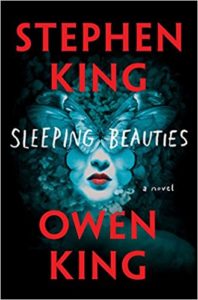 What would the world be like if all the women disappeared? What would happen to our planet if the only inhabitants were female?
What would the world be like if all the women disappeared? What would happen to our planet if the only inhabitants were female?
Both of these questions are answered to a certain degree in Stephen King’s latest novel, Sleeping Beauties – co-written with his youngest son, Owen.
In truth, I’d been thinking about the aforementioned questions long before reading this father and son collaboration (and especially after seeing Wonder Woman). The news headlines get more depressing every day. I’ve always loved to read, but more and more lately I find it (and watching comic book movies) necessary for my mental health – an escape from the horrors happening in America.
Sometimes I daydream about living in a society seriously (or completely) lacking in testosterone. Would there be wars waged due to greed, megalomania or religion? I doubt it. Crime would still exist, since women aren’t perfect human beings, but the earth would be a safer place to live in so many ways. (Alas, it takes both sexes to keep the human race going, of course.)
Now…back to the book I’m supposed to be reviewing. I admit when the hefty novel arrived in the mail, I was a little disappointed. I was hoping for a shorter read than 700+ pages. These days I prefer novellas due to my hectic schedule. Also, most of the time, I find lengthy tomes fail to hold my attention because they should have been more ruthlessly edited. (For this reason, I failed to tackle two of Stephen’s previous novels, Duma Key and Under the Dome.)
Sleeping Beauties could have been shorter and would not have suffered from an omission of certain characters and their extensive characterizations. I’ve never read any of Owen King’s previous work. Bringing characters to life in extreme detail is a talent his father has always possessed (and some critics believe he goes too far). I understand that a cast of hundreds is sometimes necessary to bring a story to fruition, but it can be hard to keep all of them straight in my head. (There’s even a fox running around in this tale with his own point of view.)
With Owen’s contribution in descriptions and dialogue, the novel did have a different feel than other King offerings. I’m curious to know which one of them thought up the premise – an idea I immediately found intriguing.
The setting is an Appalachian town not far from Wheeling, West Virginia. One seemingly ordinary day in Dooling, it’s discovered that women who fall asleep cannot wake up. The scientists call the world-wide sickness the Aurora virus. The females are wrapped in mysterious cocoons while they are at rest, and when the fibrous covering is forcibly removed, the women awake in a rage. Before returning to their slumber, they try to kill the person unwise enough to disturb them.
A lot of the action takes place at a local women’s prison. Several of the main characters either work there or are inmates. The jail’s psychiatrist, Clint Norcross, is a key figure, as is his wife Lila, who happens to be Dooling’s sheriff. And then there’s Eve Black – a beautiful young woman who is arrested for murder and whose special abilities convince people she must be a witch.
Of course, I immediately thought of the Biblical version of Eve. Some of the comments she makes early in the book reinforce that portrayal – along with these lines from the prologue, set in an Eden-like clearing complete with exotic animals and a mammoth tree: “Evie doesn’t trust the snake, obviously. She’s had trouble with him before.”
It becomes apparent that Eve is responsible for the malady that has befallen the female population. She is unaffected by the sleeping sickness. But what’s her motive?
Well, perhaps she’s trying to right a wrong. “I think it may be time to erase the whole man-woman equation. Just hit DELETE and start over.”
She’s set the plan in motion. What happens to the women after they fall asleep? They wake up in what looks like the same world, albeit a post-apocalyptic version many years in the future where all the men have disappeared. Eventually they name their haven Our Place. It’s not a utopia, but the women have a fresh start in a world that has gotten safer.
But what happens to a woman there when she dies in the real world? If she perishes in Our Place, what happens to her cocooned body? Answer: something bad.
In the present, men are having a hard time adjusting to life without the womenfolk – and some idiots even decide to begin torching the sleeping women to prevent the spread of the virus. (I was surprised there were no attempted rape scenes – and no mention of husbands missing their conjugal rights more than the cooking and housekeeping services wives tend to provide).
Chaos begins to reign, and a small faction of Dooling’s male population come up with the idea of storming the prison so they can force Evie to reverse the pandemic.
Is there truly a way for the women to return home? Can the world revert back to normal?
I found the first half of the book to be faster-paced than the second half. As I expected, the denouement was rather open-ended. I wish the enigmatic Eve’s identity and motivations had been more fully explored and revealed. She’s a pivotal character, but we know next to nothing about her and the authors choose to let her origins remain a mystery.
I’d be perfectly willing to give Sleeping Beauties four out of five goblins if it weren’t for its unnecessary lengthiness. I think three and half will have to do.

 What would the world be like if all the women disappeared? What would happen to our planet if the only inhabitants were female?
What would the world be like if all the women disappeared? What would happen to our planet if the only inhabitants were female?